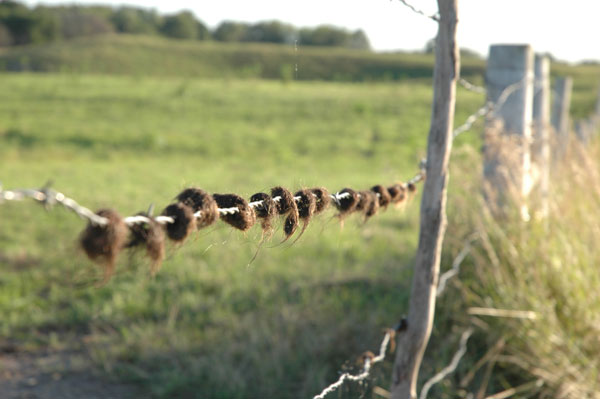Strong Fences Lessen Your Legal Liability
Understanding fence laws, having a plan and carrying insurance are all part of corral fence liability.
April 24, 2012

As newfangled barbed wire became a staple of the American West, Native Americans took to referring to it as the Devil’s Rope.
You’ll likely call it worse if your fences ever let you down and your cattle wind up amid a catastrophic injury case, or even a non-catastrophic one.
“It doesn’t matter how much the cattle gain, what you buy them for, or how good a veterinarian you are. If your cattle get out and you don’t have insurance, you can lose everything you’ve spent years building,” says Todd Rose of Rose Law Firm, Paris, TN. He’s tried more than 150 jury trials in Tennessee and the Southeast, many of them involving catastrophic injury.
Aside from the inherent tragedy, Rose says catastrophic injury cases can lead jurors to decide in favor of a plaintiff seeking damages even when the fault of the defendant is tenuous.
“It’s human nature to empathize with someone catastrophically injured and to want them to have as normal of a life as possible,” Rose says. “Ultimately, these cases come down to a plea for money in order to make life better for the victim.”
If wandering cattle and fences are involved, defendants also face the challenge that jurors typically have no direct knowledge of day-to-day ranching activities. While you and the neighbors understand you can’t spend every day patrolling fences, jurors unfamiliar with the industry may wonder how it is you didn’t know about a hole in the fence.
Rose explains that fence laws in many states are old, too, meaning they often don’t account for modern contrivances like cattle guards and high-tensile fence. That leaves jurors and judges with more room for interpretation about what is legal and what is reasonable.
Fence laws vary widely between states and between counties within states. At minimum, these laws will define what constitutes a legal perimeter fence. Wherever you run cattle, Rose says, ranchers need to be familiar with the fence laws.
In Tennessee, for example, a legal perimeter fence is: “any enclosure made by stretching not less than five strands of barbed wire tightly between posts firmly set in the ground, or between growing trees and posts firmly set in the ground, not more than 20 ft. apart; the topmost wire not less than 4.5 ft. from the ground, the bottom wire not less than 6 in., and the next to the bottom wire not less than 15 in. from the ground.” It was written in the middle of the last century.
“Fencing laws define the legal minimum for a perimeter fence, but the nature of your operation may require that your fences exceed the legal minimum,” Rose says.
In cases involving escaped cattle, Rose says, “A judgment for monetary damage is typically going to be based on determining some degree of fault on the part of the farmer or rancher. Invariably, these cases boil down to what you didn’t do, rather than what you did.”
First, Rose says cattle should be identified by permanent means so that ownership of the cattle can be established without question.
Next, Rose says, “Have a sound plan for inspecting and maintaining your fences, and stick to that plan. If you go to a court case involving cattle getting out, your plan and actual practices will be issues.”
Likewise, Rose advises, “Make sure you have the tools, supplies and resources to address both escaping livestock and a broken fence in an emergency situation, under the worst conditions you can imagine. This includes either having or knowing someone with a tranquilizer gun and cowboys who know how to rope cattle.”
“Make sure you have insurance that covers damage caused by escaping livestock, and make sure the policy language states that. That’s what will protect you from potentially unlimited risk,” Rose says. He adds that another benefit of liability insurance is that the insurance company must provide you with a legal defense.
“Don’t take someone’s word for what’s in the policy,” Rose emphasizes. “If you need to, hire a lawyer to go through it and present them with what-if scenarios. Ask them, if this situation happens, does this policy cover me?”
Even if you do have liability insurance, though, Rose suggests reviewing it every year, as well as informing insurers whenever your operation undergoes significant, fundamental change – be it in sheer numbers or in terms of enterprises. The reason is that, when faced with large financial claims, insurance companies often look for reasons that you breeched the contract, meaning they don’t have to pay.
Promptly notifying insurers also has to do with the statute of limitations for personal injury cases, which vary from state to state. In Tennessee, the statute for individuals of legal age is one year. If plaintiffs haven’t attained legal age, they have the time until they reach legal age, plus a grace period to file a suit.
That’s before considering federal laws. “When damages exceed $75,000 and there’s a diversity of state citizenship of the parties involved, the case can be tried in federal court,” Rose says.
“Buy plenty of insurance before you let the first one off the trailer,” Rose says. “For a stocker operation, I don’t think $1 million (liability insurance) is enough.”
Note: Rose emphasizes that his general comments are not intended to be used as legal advice for a particular rancher or operator. Rose strongly encourages each rancher to consult his attorney before any of these potential issues arise.
Sidebar: Cows vs. cars
According to Todd Rose, of Rose Law Firm, Paris, TN, dealing effectively with an accident involving cattle that found their way beyond your perimeter fence involves lots of common sense:
Be available – “If possible, know your neighbors and make sure they have your cell phone number or a way to reach you; bad situations get worse when no one can find the owner.”
Be involved – “If possible, be personally involved in dealing with the incident. Make sure anyone involved in an accident is taken care of before dealing with the escaped cattle.”
Determine that the cattle are yours –“If there’s a break in your fence and livestock are involved in causing damage, if there’s any question as to the ownership of the animal, there’s a good chance a jury will say they’re yours.”
Tell your insurer – “Report the incident to your insurance company as soon as reasonably possible; follow a verbal report with a written one.”
Wait for your day in court – “You can’t win your case on the side of the highway, but you can lose it. For example, that isn’t the time to shout to everyone that this is the fifth time your deadbeat, good-for-nothing neighbor has tried to figure out a way to sue you for easy money.”
Check the perimeter fence – “If your fence was inadequate, even if it was legal, don’t allow an escape to be repeated because the legal consequences of the second instance will likely be worse.”
About the Author(s)
You May Also Like




.png?width=300&auto=webp&quality=80&disable=upscale)
